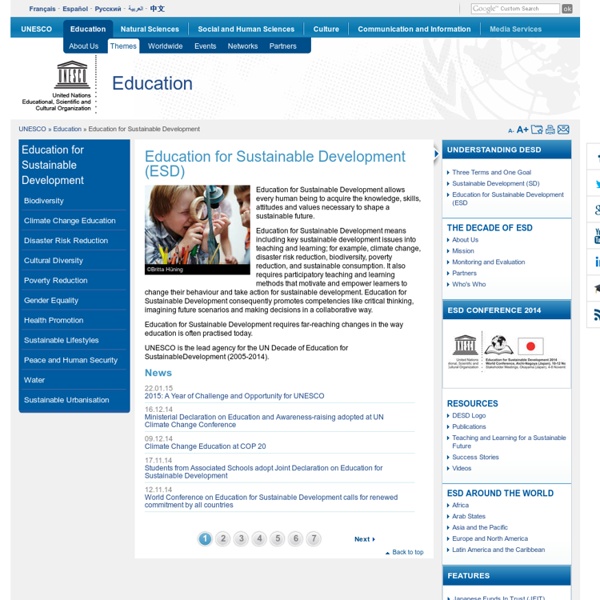



loving plants to sustain the Earth U.S. Partnership water protection Educational needs of the 16–19 age group: A sociological perspective This paper attempts to draw a sociological profile of young people in Europe between 15–19 years of age. It points out changes in the socialisation functions of the three institutions, family, school and peer group. The second half of the article surveys quantitative aspects of the educational performance of this age group, pointing out similarities and dissimilarities between the various European countries. The final part is concerned with the effects of inequality of opportunity (socio-cultural, sex-based, and regional) on educational achievement. In diesem Aufsatz wird versucht, ein soziologisches Bild von Fünfzehn- bis Neunzehnjährigen in Europa zu geben. Im zweiten Teil bringt der Artikel einen Überblick über die quantitativen Aspekte der Erziehung dieser Altersgruppe, wobei die Ähnlichkeiten und Unterschiede zwischen den verschiedenen europäischen Ländern gezeigt werden.
Education for Sustainability | Sustainable Schools Project Educating for Sustainability is “learning that links knowledge, inquiry, and action to help students build a healthy future for their communities and the planet.” EFS helps teachers bridge grade levels and subject areas, curriculum and school operations, parent and community partnerships. Through SSP, a school develops its own meaningful, coherent approach to improve curriculum, community partnerships and campus ecology. Teachers learn about the community’s vision and strategies for a sustainable future, then bring this larger dialogue into their curriculum with a focus that’s appropriate for their students. This fosters ongoing school-community partnerships that gain staying power from their ties to the curriculum and to each other. With each lesson learned, students develop their own understanding of the web of connections that make up their community and their role in it. Read the US Partnership's White Paper on Education for Sustainability.
EJView EJView This form creates an interactive map. Interactive mapping tools are a challenge for accessibility due to the inherent visual aspects of mapping. These maps cannot be made fully accessible under Section 508 of the Rehabilitation Act of 1973 (as amended in 1998). If a person needs accommodations due to a disability, additional assistance is available in obtaining information. Go to EJView A study area can be a place or an area. The following are examples: For more information on EPA's Geospatial Program
What can we do in school Principles of Sustainability The earth is a naturally sustainable system. However, the accumulated impacts of human activity threaten our continued well-being. Research by an international network o f scientists defined three basic conditions that must be met to maintain the essential natural resources, structures and functions that sustain human society. They also acknowledged that human action is the primary cause of the rapid degradation of nature. A fourth system condition addresses the social and economic considerations driving those actions and our capacity as human beings to meet our basic needs. While written to be clear scientifically, the specific wording of the four system conditions can be confusing. The problem is not that we mine and use heavy metals, or use chemicals and compounds produced by society, or disrupt natural processes, or even temporarily interfere with people’s capacity to meet their basic needs.
greenlevine | The Green Levine Machine: Sustainability Education in Action Ecological / Energy Footprint of Schools While you are playing this electronic game you can learn about the ecological footprint of your school, in other words which is the quantity of carbon dioxide that is emitted because of your daily habits which are related to the consumption of energy. Follow the arrows which lead you from room to room and click on the hands that appear on different appliances. At the end you will have a clear picture of how much energy you consume and the quantity of carbon dioxide that is emitted because of that energy. Moreover, you will have some advice on how you can avoid the emission of one part of carbon dioxide and at the same time how to save energy and money.
THE CLUB OF ROME Club of Rome “How the Quest for Mineral Wealth Is Plundering the Planet” – Find out more about the 33rd Report to the Club of Rome, to be released in English on 12th June 2014! [...] Shale Gas Fracking – Bubble, Scare or Solution? Hydraulic fracturing – or “fracking” – of shale gas is a highly controversial contemporary topic in politics, society and business alike. A New Story for a New Economy Economists debate whether the economy is recovering from the financial crash of 2008. Why Empires Fall Empires seem to be a typical human structure that reappears over and over in history. Direct Democracy for Climate Protection in Switzerland The Club of Rome is organizing partner of the “Klimalandsgemeinde 2014″, a project based on the traditional Swiss direct democracy approach, granting 10.000 Swiss Francs for the implementation of local climate protection initiatives. [...] Club of Rome Member Ashok Khosla honoured with Zayed International Prize Acting on climate change
Community based social marketing Les Milbrath was fond of reminding me that “nature bats last.” What Les meant by this was that we live in a finite world and humanity will eventually be forced to adopt sustainable practices. While we have no choice regarding whether we eventually adopt these practices, the speed with which they are adopted will determine the grace with which we make this transition. This book is about making the transition gracefully. It provides a comprehensive introduction to community-based social marketing and how it is being applied throughout the world to foster sustainable behavior. Community-based social marketing draws heavily on research in social psychology, which indicates that initiatives to promote behavior change are often most effective when they are carried out at the community level and involve direct contact with people. For those who are contemplating entering this field, I would like to offer the following words of encouragement.